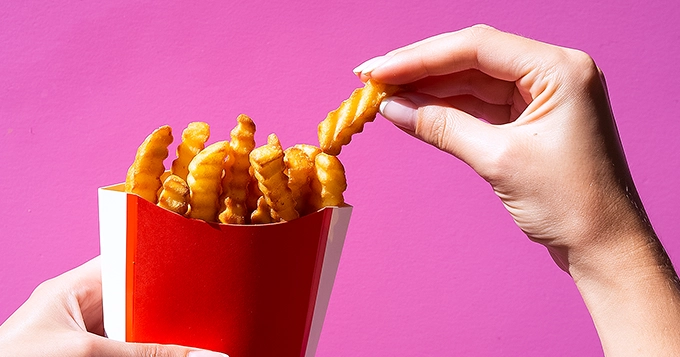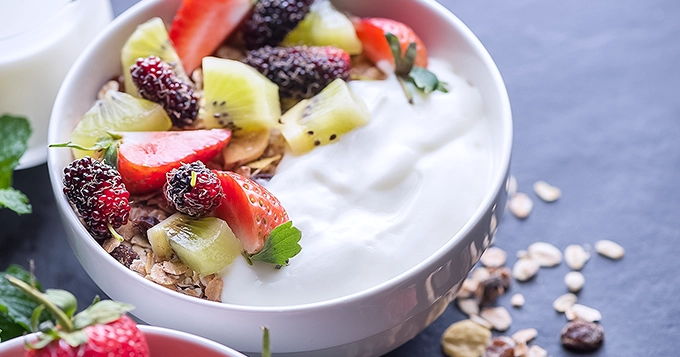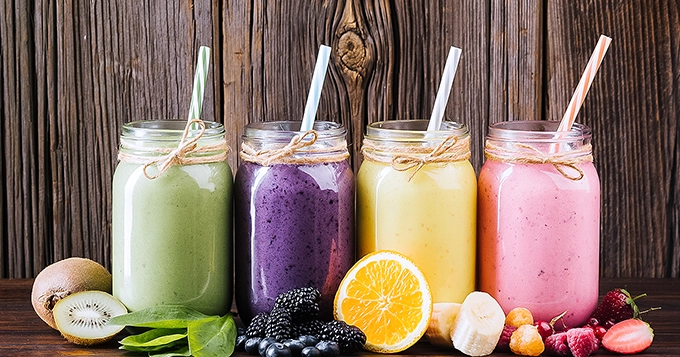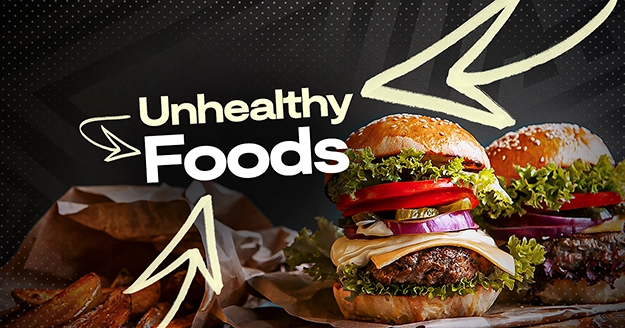What makes food unhealthy?
The processing and the types of ingredients the food contains can make it unhealthy. Sugar, sodium, and fat (saturated fat and trans-fat) are ingredients that you should always try to monitor when grocery shopping or eating out.
The American Heart Association recommends the following:
- Limit the consumption of saturated fat to less than 7% and trans-fat to less than 1% of your daily calories.
- Consume less than 1,500 mg of sodium daily.
- Men should consume no more than 9 teaspoons (36 g) of added sugar per day. For women: 6 teaspoons (25 g) per day.
8 Unhealthy Foods You Should Watch Out For
-
Soft drinks
Sparkling beverages are significant contributors of both added sugars and caffeine in a person’s diet. Consistent intake of these heavily processed drinks can contribute to various health issues such as metabolic syndrome, obesity, type II diabetes, and inflammatory conditions. Opting for more nutritious options, such as herbal tea and lemon water, is recommended
-
Instant noodles
A valuable piece of advice for maintaining well-being is to steer clear of foods labeled as “instant.” Instant noodles are loaded with excessive amounts of sodium. They contain elevated levels of monosodium glutamate (MSG), which can have adverse effects on the nervous and reproductive systems, acting as a potential toxin.
-
Bacon
Bacon is high in both sodium and saturated fat, which don’t really have the greatest benefits for your health. Diets high in saturated fat and sodium can lead to health issues such as hypertension, atherosclerosis, high cholesterol, and heart disease.
-
Breakfast cereals
Many breakfast cereals are prepared using refined grains. Compared to whole grains, refined grains lack filling nutrients such as protein and fiber.
Most breakfast cereals are also high in added sugar. Elevated sugar intake can cause heart disease, hypertension, and high triglyceride levels.
-
Frozen yogurt
Compared to regular yogurt, frozen yogurt is not always a healthier choice than ice cream. It is generally lower in fat than ice cream, but it is usually very high in added sugar. Some stores also only offer large cups, which a lot of people tend to fill. Some also offer high-caloric and sugary toppings, which add significant amounts of sugar.
It’s completely fine to indulge in ice cream or frozen yogurt once in a while, as neither is inherently a healthier option than the other. Just make sure you manage your calorie and added sugar intake by selecting smaller portions.
-
Alcoholic drinks
It is known that alcohol is one of the worst unhealthy foods because of its negative effects on health. Excessive alcohol consumption can lead to various enduring health problems, such as liver cirrhosis and failure. It can also irritate tissues, making them more vulnerable to damage from carcinogens, which are substances known to cause cancer. Too much alcohol intake is also associated with problems like dehydration, headaches, and irritability.
-
Pre-made smoothies
Homemade smoothies are healthy and nutrient-dense. They are a creative and convenient way to increase your consumption of fruits and vegetables.
However, pre-made smoothies can contain high amounts of calories and sugar. When purchasing a smoothie while on the go, be sure to review the ingredient label before placing your order.
-
Canned soups
Numerous individuals view canned soup as a nutritious and convenient snack for satisfying hunger. Nevertheless, despite common perception, these soups contain high levels of salt. While salt is necessary in moderation, it serves as a significant contributor to sodium, and excessive intake can elevate the risk of hypertension and heart attacks.
Fats in canned soup tend to be saturated fat, which can raise your low-density lipoprotein (LDL) cholesterol levels, also known as the “bad” cholesterol.
How to make healthy food choices?
Here are some tips on how to avoid unhealthy foods and make healthy eating habits.
- Understand health claims
When assessing a product’s nutritional value, it’s essential that you examine the health claims, such as “low in fat” or “sugar-free,” as these claims might be misleading.
Products are usually labeled as “sugar-free” or “no added sugar,” implying they have no sugar at all. However, in some cases, this only means they don’t contain added sucrose or table sugar. Other types of sugar may still be present, and the product could also have salt and fat and be high in calories. Therefore, even sugar-free items can still be considered junk food.
- Plan your meals
Preparing your meals and snacks in advance allows you to make informed choices about nutrition instead of settling for whatever is conveniently available. This strategy also helps you stick to a budget and simplifies grocery shopping by ensuring you have everything you need on hand.
- Choose wholegrain
Select whole grain and whole wheat options for carbohydrates such as pasta, bread, and flour. These whole food choices are more nutritious than their refined counterparts.
- Fruits for snacks
Opt for fresh fruit as a healthier alternative to junk food for dessert. Fresh fruit is free from added salt, sugar, and saturated fat, making it a better choice for maintaining a healthy diet.
- Avoid skipping meals
Try to avoid missing meals as it could lead to craving for unhealthy foods. When we miss meals, our blood sugar levels drop, causing us to crave quick-fix foods that are often high in calories, salt, sugar, and saturated fat. This can negatively impact our overall health and can contribute to weight gain.
Conclusion
In conclusion, making healthy food choices is important if you want to achieve overall well-being and prevent various health issues associated with poor dietary habits.
By understanding the detrimental effects of unhealthy food choices and putting these tips into your daily routine, you can take control of your diet, reduce the risk of chronic diseases, and promote a healthier and happier life.










